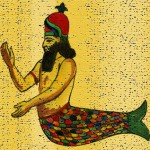Joshua Chapter 1
Like many other books of the "Old Testament", Joshua is grouped differently in the Hebrew canon; it's considered the first book of the Prophets. The best bet is that the earliest recognizable version of this book was prepared by the scribes of either King Hezekiah of Judah or his descendant King Josiah. They wrote it because their king wanted to reunite all of Israel under Jerusalem's rule. The story of Joshua conquering Canaan was the perfect story with which to inspire the people, to convince them that the LORD would bless Judah's liberating Canaan from the Assyrians if only they would believe and be faithful.
I should just go ahead and say it now: from what archaeologists have discovered, Joshua's invasion of Canaan can't possibly have really occurred - any of it, at all. Egypt actually ruled Canaan during the traditional time period (the Late Bronze Age) in which the Israelites are supposed to have invaded. None of the less traditional ideas about when the Israelites might have attacked work either, for various reasons.
More than that, details like the number of Israelites with Joshua (Numbers 1:26) are transparently untrue. The tribe of Judah, for instance, is listed as contributing almost 75,000 soldiers to the Israelite army, but archaeologists can't find evidence in the land it settled for a larger population than 12,000. For another comparison, consider this: Rome is known to be the first city to ever reach a population of one million people, which it did over a thousand years after Joshua's day - but a conservative estimate of the Israelite "camp" under Joshua would have to at least exceed 3 million. For the Late Bronze Age, that's just crazy talk.
But not necessarily for scribes living five hundred years later, who might at least have imagined such fantastic numbers. And the reason why we can finger those later priests of Judah as the writers of Joshua is because the Canaan which Joshua is depicted conquering corresponds nicely with Canaan as the priests would have known it in the time.
Summary:
The Book of Joshua was written in the 700-600s B.C.
It was written to serve as an example to the people, so they would support the king of Judah's plans to overthrow the Assyrians and unite Israel. The people who read the book were supposed to see their current king as a new Joshua and themselves as God's new army.
It's quite possible a lot of events written about in the Book of Joshua really happened, but probably not in the context in which they're presented.
Alright, that's it for preliminary discussion. Let's move onto the content.
1:1 Now it came to pass after the death of Moses the servant of the LORD, that the LORD spoke unto Joshua the son of Nun, Moses' minister...
The most interesting thing about Joshua, from a biologist's perspective, is how he could have a fish for a father.
Because apparently he did: "Nun" means "fish" in Aramaic (it's not a Hebrew word). And while the Israelites often gave their children strange names, "fish" is still too odd to be one of them.
Most scholars don't find that interesting, but at least one of them does: Dr. Robert M. Price wonders if Joshua, clearly a famous figure in ancient Canaan, originally had no place in the Israelite genealogies at all, but was once instead a legendary half-god, half-human warrior like Hercules or Achilles. His father would have been one of the elohim of the waters, someone like (but not) the Philistine sea god Dagon (pictured above).
According to this theory, the Israelites retooled Joshua's legend after they switched from polytheism to henotheism (and from henotheism to monotheism): Joshua became simply a hero and nobody paid any attention to his father, who was presumed to just be some poor jerk who spent most of his life as a slave in Egypt.
This theory also explains the miracles that God performs for Joshua: originally, Joshua performs the miracles himself.
The rest of Joshua 1 isn't very interesting, just Joshua giving Team Israel a pep talk before the big game, so we'll stop here. Hope you had fun.
NEXT: Joshua, Chapter 2. Maybe.
OTHER POSTS IN THIS SERIES: Joshua 9 Joshua 7-8 Joshua 5-6 Joshua 2-4
This entry was tagged. Bible Commentary Joshua
